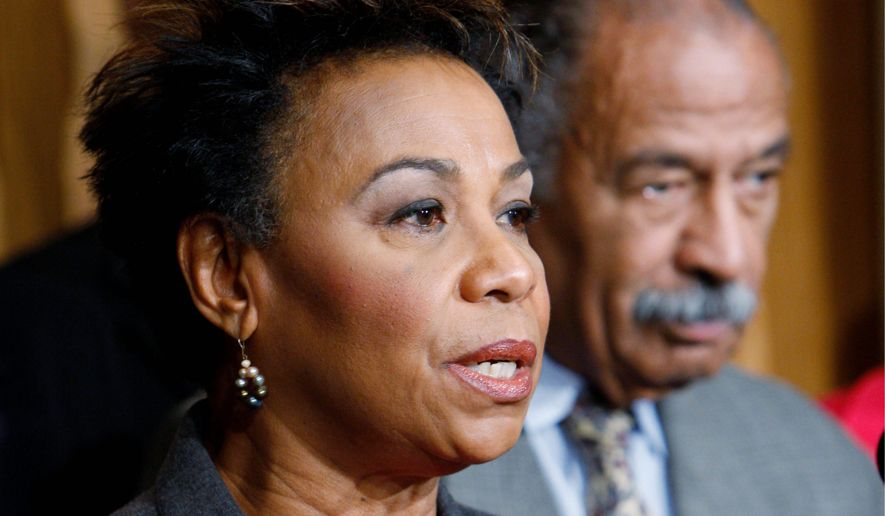64 US congress members criticise President Trump's military threats against North Korea and call for diplomacy. President Trump then supports diplomacy in his meeting with the South Korean President.
A letter to President Trump, led by PNND members and endorsed by 64 Members of the United States House of Representatives, may have been one of the factors moving President Trump to soften his militaristic rhetoric on North Korea and shift his position towards supporting denuclearisation negotiations.
PNND members John Conyers, Jr. (D-MI), Barbara Lee (D-CA), and Congressman Jim McGovern led the letter signed in late May 2017 by 64 US congressmembers criticising President Trump’s military threats against North Korea, reminding the President that military strikes without Congressional approval would violate the Constitution, and urging him to follow a diplomatic approach, as had been articulated by his Secretary of State Rex Tillerson.

The 64 signers represent the 64 years since the Armistice Agreement was signed, putting a halt to the fighting but not officially ending the Korean War or resolving the underlying conflicts.
"As someone who has watched this conflict evolve since I was sent to Korea as a young Army Lieutenant, it is a reckless, inexperienced move to threaten military action that could end in devastation instead of pursuing vigorous diplomacy.” said Conyers, one of two remaining Korean War Veterans serving in Congress.
“As a daughter of a veteran of the Korean War and a member of the Military and Veterans Appropriations Subcommittee, I will continue to demand that President Trump provide Congress with a comprehensive strategy for deterring North Korea that puts diplomacy and non-military strategies first,” said Congresswoman Barbara Lee.
The letter notes that “Military action against North Korea was considered by the Obama, Bush and Clinton Administrations, but all ultimately determined there was no military option that would not run the unacceptable risk of a counter-reaction from Pyongyang.”
The letter urges Trump to “adhere to the diplomatic approach articulated by Secretary Tillerson,” who recently stated that the Trump Administration’s sole goal is to “seek a denuclearized Korean Peninsula” without pursuing a regime change that could potentially risk a devastating conflict.
The call for diplomacy was supported by policy analysts in the U.S. including Thomas Graham Jr., Chair of the Bipartisan Security Group a partner organisation of PNND (See Time to Negotiate with North Korea, by Thomas Graham Jr., US News World Report, June 23, 2017).
Then, in his meeting with South Korean President Moon Jae-in on June 30, President Trump indicated a change of approach towards diplomacy, joining the South Korean President in stating that 'the United States and the ROK do not maintain a hostile policy toward the DPRK and, together with the rest of the international community, stand ready to offer a brighter future for the DPRK, if it chooses the right path. The two sides will closely coordinate on a joint the DPRK policy, including efforts to create conditions necessary for denuclearization talks, through a high-level strategic consultation mechanism.' (Joint statement between the United States and the Republic of Korea).
President Moon Jae-in noted that solving the North Korea nuclear issue 'will be the most fruitful achievement that we can achieve during our terms in office.. I also believe that this will be the greatest diplomatic achievement for President Trump as well.'
The Congressional letter urges the Administration to not only address the nuclear issue, but also to “address humanitarian issues of mutual concern such as the reunification of Korean and Korean American families as well as the repatriation of the remains of US servicemen left in North Korea following the War.”
“Like thousands of other American families who pray to bring their loved ones home, I hope to go back and bring my father home. Calls for diplomacy like this make that opportunity much more real” said Rick Downes, Executive Director of the Coalition of Families of Korean & Cold War POW/MIAs.
**********************************
Signers of the congressional letter include 5 Democratic Members of the House Foreign Affairs Committee and the leadership of the Congressional Progressive Caucus. The 64 letter signers include: Alma S. Adams (NC-12), Karen Bass (CA-37), Joyce Beatty (OH-03), Don Beyer (VA-08), Earl Blumenauer (OR-03), Suzanne Bonamici (OR-01), Michael E. Capuano (MA-07), Salud O. Carbajal (CA-24), Judy Chu (CA-27), David N. Cicilline (RI-01), Katherine M. Clark (MA-05), Yvette D. Clarke (NY-09), Wm. Lacy Clay (MO-01), Emanuel L. Cleaver, II (MO-05), Steve Cohen (TN-09), John Conyers, Jr. (MI-13), Danny K. Davis (IL-07), Peter A. DeFazio (OR-04), Rosa L. DeLauro (CT-03), Nanette Diaz Barragán (CA-44), Lloyd Doggett (TX-35), Keith Ellison (MN-05), Anna G. Eshoo (CA-18), Adriano Espaillat (NY-13), Dwight Evans (PA-02), Bill Foster (IL-11),Tulsi Gabbard (HI-02), Raúl M. Grijalva (AZ-03), Luis V. Gutiérrez (IL-04), Colleen Hanabusa (HI-01), Alcee L. Hastings (FL-20), Eleanor Holmes Norton (DC-AL), Sheila Jackson Lee (TX-18), Pramila Jayapal (WA-07), Eddie Bernice Johnson (TX-30), Henry C. “Hank” Johnson, Jr. (GA-04), Ro Khanna (CA-17), Brenda L. Lawrence (MI-14), Barbara Lee (CA-13), Ted W. Lieu (CA-33), Alan S. Lowenthal (CA-47), James P. McGovern (MA-02), Gwen Moore (WI-04), Jerrold Nadler (NY-10), Richard E. Neal (MA-01), Rick Nolan (MN-08), Frank Pallone, Jr. (NJ-06), Donald M. Payne, Jr. (NJ-10), Chellie Pingree (ME-01), Mark Pocan (WI-02), Jamie Raskin (MD-08), Bobby L. Rush (IL-01), Janice D. Schakowsky (IL-09), Robert C. “Bobby” Scott (VA-03), José E. Serrano (NY-15), Carol Shea-Porter (NH-01), Louise Slaughter (NY-25), Darren Soto (FL-09), Mark Takano (CA-41), Niki Tsongas (MA-03), Nydia M. Velázquez (NY-07),Bonnie Watson Coleman (NJ-12), Peter Welch (VT-AL), and Frederica Wilson (FL-24)


